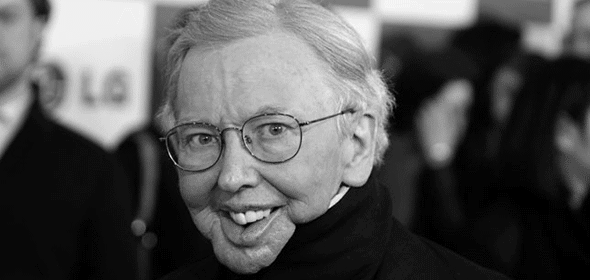Most of the time I am too busy to entertain such fantasies. I have filled my life so completely that many days there is no time to think about the fact that I am living it. But these moments, usually in a strange city, give me the illusion that in some sense the person that is really me sits somewhere quietly at a table, watching it all go by.
- Roger Ebert, "My Life: A Memoir"
If we're defined by the media we consume, then a significant portion of who I am is directly attributed to Roger Ebert. Next to my father, no one had a greater influence in not only the films I watch, but in how I watch them. Always open, always receptive, and and always wondering, questioning why something affected me the way it did. Falling into the role of film critic at the Sun-Times in 1967, Ebert immersed himself in the fundamentals of cinematic language the same way so many of us who love film did: by soaking in the silver celluloid glow of as many movies as he could. His film criticism, always in the first person, never failed to convey the passion derived from simply jumping in, connecting a film's themes and technique as often as not to something completely outside the world of cinema, unafraid to judge a movie on how it affected him emotionally, even if it confused him intellectually.*
It was the television show in all its iterations that drew me in, but it was his writing that had the most influence on my life. Whether it was his series of essays on the Great Movies (currently collected in three volumes), his weekly reviews at the Sun-Times or the online journal (calling it a "blog" seems a disservice) he turned to late in his life there was always something that reached out. Through his guidance I learned why Bergman is so much more than a visual reference in Woody Allen movies; why the stillness of the camera in an Ozu film can be as emotionally stirring as the whiplash movement in a Kurosawa epic; that it's not what a movie is about, it's how it is about it.**
But more than that, I saw expressed in his writing the same fears, the same doubts, and the same joys in life that I had. Even if the triggers were different, I could recognize the spirit of contemplation, of resolve that had been and is often still missing in my own life. It's the type of writing I've always aspired to. More often than not I would fail, but now and again, usually when I wasn't thinking too hard it would catch: a word, a paragraph that would ring true. I would read it out loud and know that this was my voice, the cadence caught and the idea clear, and sometimes it could carry the weight right to the finish line. If you write, you know the feeling.
"If you write, you know the feeling." The thing about writing is you have to actually write. And for too long I've said "I write" even as the pages start to yellow and the keyboard gathers dust.
But then Roger Ebert died, and the best I can do is try to emulate a man who, in his own words, filled his life so completely that many days there was no time to think about the fact that he was living it. It's a beautiful quote, almost misleading you to think it's something good. For too long I've filled my so completely I've been forgetting I'm living it.
Rather than watching it all go by, it's time to stop and live it. Rest in Peace, Roger.
*I modified the quote from Ebert, which is "Your intellect may be confused, but your emotions will never lie to you."
**Probably the best advice on film criticism I've ever read



